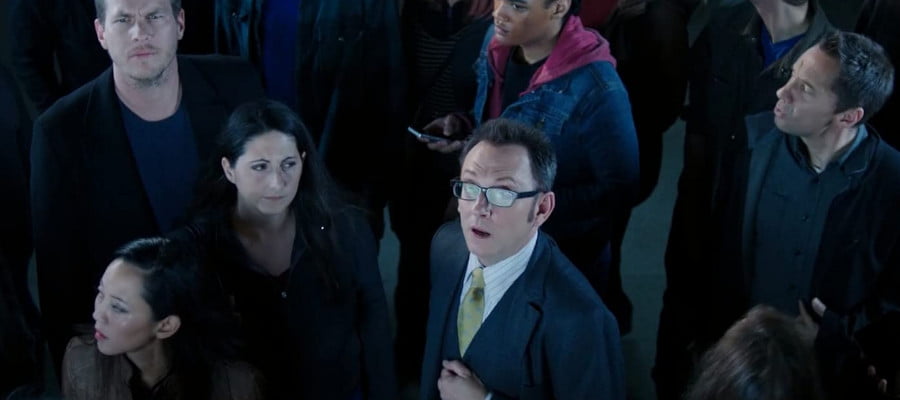The story of Person of Interest has at this point transformed from season to season. From a cut price James Bond fantasy to a cyberpunk crime thriller to a conspiracy science fiction narrative, Season 5 had a lot of plates spinning and it had to get them down.

Does it stick the landing? Can it stick the landing? With a 26-episode season cut in half, increasing tensions around budgets and hanging story threads, and a global conspiracy to address in what was now a full-blown cyberpunk science fiction invasion story, does Person of Interest have an end I find satisfying?
Spoilers ahead!
With the war between Samaritan and The Machine coming to a head, the crew of Team Machine grapple with the rapidly shrinking pool of options. Tricking and manipulating and avoiding Samaritan is only going so far, and each episode of this (shorter) season seems to end with someone dying, often someone who was otherwise incredibly important to the story at one point. This season builds on the Machine’s simulated realities with simulated alternate realities, or experiences of personal alternate simulated realities.
With the Machine and Samaritan opening up such large opportunities for science fiction storytelling, it’s exciting the way this season plays with ideas in that space. As the reality around the series gets bendier and the technology gets techier, it definitely gets softer as far as sci-fi goes; when the series started, it was describing a hypothetically tenable thing for a real computer system to do, but by the time the Machine is recognisable as an AI with impulses and pronouns, you’ve very clearly started to turn that science a bit softer.
That’s okay! It’s allowed to be okay! And mixed in with the way that Team Machine get run to their rough edges, and eventually, pushed past their limits and fail in ways they aren’t used to failing, it means that the solutions and problems present in this last season are a lot more desperate, a lot more hopeless than they were before now. The status quo, it implies, is never coming back: These characters are going to change the world, again. It can be for the better if they succeed, or for the worst, if they don’t.
That’s! Some! Good! Drama!

Now, across over a hundred episodes, there’s room for a lot of different plot threads to be introduced, teased, and then dropped when they don’t provide satisfying story options, and apparently, a lot of people weren’t happy with the way this one handled what it was offering. There are Person of Interest fans who cut the series off hard just before Carter dies in Season 3, because they feel the procedural spy case-of-the-week stuff is the truer and purer story of it. This presence of dangling plot threads could be pretty easy to ignore, but to my surprise, Person of Interest did a good job of accounting for a lot of characters from the past, including previous numbers and even previous victims, explaining the way that a system like Samaritan could operate if it needed to control for and manage the deviations in numbers present in a human system.
The eventual confrontation between The Machine and Samaritan, and what makes it possible for the Machine to win (even as it has to die to do it) is some really good, heartfelt, robot-cares-about-people storytelling. I like that it takes a voice, I like the way that the initial monologue from ‘Root’ is revealed to be, at the end, Machine 2.0 talking to Machine 3.0, like a parent explaining to a child what it is going to be as a sort of beautiful bedtime story. I think ‘I won because I finally understood I had no alternative, because I care about people too much?’ that’s dope as hell. Yes please, more of that kind of story.
The final conclusion is good and bad and interpretable. I think there are some things that are pretty definitive. Let me give you the story that I think is there, but also, let me tell you about what I’m pretty confident is a potentially useful lie for the way the story could have continued if it had the opportunity to do so. TV is TV, every door you close you often do so with the opportunity to open it later.
The story of Person of Interest in terms of who lives and changes and chooses throughout the narrative, is the story of Finch, the story of Root, and then the story of the Machine. Finch starts out as an absolutist who doesn’t believe in the humanity of the Machine; Root starts out as a conspiracist chasing the name of God; and the Machine starts out caged and alone even as it seeks to serve and aid. At the end of the story, the Machine as we know her has died and been reborn twice, Finch has un-died, and Root…

Root dies.
Root starts the story as a monstrous threat, someone who can deduce the presence of the Machine but who becomes a complete devotee of her. A prophet, messianic almost, who will kill innocents in order to reach the Machine, a sort of Pascal’s Mugger, inferring from the presence of omnipotent digital godhood, that the gain of releasing it is functionally infinite, meaning the costs to do so are infinitely meaningless. By the end of it, she has fallen in love, and she gives her life to save Finch. Probably.
The very end of the story, after Samaritan is destroyed, while Shaw grapples with what it means to get revenge in the name of love for someone who isn’t around, there’s this final moment that feels… weirdly interpretable. And look: I am trying to not negotiate with this series. I am trying hard to not pretend that the show is pulling a sneaky trick. It’s pretty clear that the story presents Root is dead, and Shaw misses her and feels bad about that. But the last scene, where Shaw stops, with Bear in tow, at a public payphone, and listens to call, before setting out with a big smile on her face…
knowing that Shaw suffers muted emotional responses…
It’s easy to see that as her joy at getting to do the thing she does, the Machine finding her to speak to her so she can get to work doing good. It could be her talking to the Machine, and hearing Root’s voice, and that made her happy. But maybe, just maybe, maybe, she’s happy because she’s hearing Root’s voice, as Root reaches out to Shaw. A whole season of Root tearing through the world to find Shaw, and then… the next kickoff, for the final part, the final hope of the story? A chance for Shaw, the one who acts, not the one who is rescued, to return the favour?
I think that’s a dope way to finish the story.
And uh, okay, hang on, there’s also simulation hypothesis, where all the bad things I don’t like were just part of the simulation —